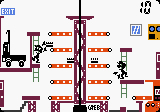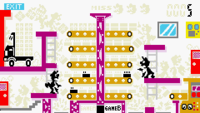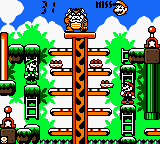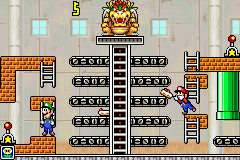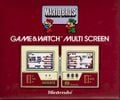Mario Bros. (Game & Watch): Difference between revisions
mNo edit summary Tag: Mobile edit |
m (→Trivia) Tag: Mobile edit |
||
| Line 116: | Line 116: | ||
==Trivia== | ==Trivia== | ||
*In the Modern version of ''Mario Bros.'', the player can predict when Bowser is about to change the conveyor belts' directions; he stops moving and a warning signal plays before he ground-pounds the machine. | *In the Modern version of ''Mario Bros.'', the player can predict when Bowser is about to change the conveyor belts' directions; he stops moving and a warning signal plays before he ground-pounds the machine. | ||
*[[Mr. Game & Watch]]'s forward-aerial attack in the [[Super Smash Bros. (series)|''Super Smash Bros.'' series]] involves swinging a package, much as Mario and Luigi do in this game. Additionally, Mr. Game & Watch's down taunt in ''[[Super Smash Bros. for Nintendo 3DS]]'' / ''[[Super Smash Bros. for Wii U|Wii U]]'' and ''[[Super Smash Bros. Ultimate]]'' is based on Mario and Luigi's animation after finishing a level. | *[[List of fighters debuting in Super Smash Bros. Melee#Mr. Game & Watch|Mr. Game & Watch]]'s forward-aerial attack in the [[Super Smash Bros. (series)|''Super Smash Bros.'' series]] involves swinging a package, much as Mario and Luigi do in this game. Additionally, Mr. Game & Watch's down taunt in ''[[Super Smash Bros. for Nintendo 3DS]]'' / ''[[Super Smash Bros. for Wii U|Wii U]]'' and ''[[Super Smash Bros. Ultimate]]'' is based on Mario and Luigi's animation after finishing a level. | ||
==References== | ==References== | ||
Revision as of 18:14, March 25, 2023
- Not to be confused with Super Mario Bros. (Game & Watch).
| Mario Bros. | |
|---|---|
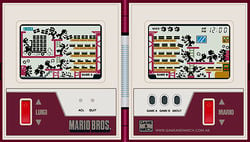
| |
| Developer | Nintendo Research & Development 1 |
| Publisher | Nintendo |
| Platform(s) | Game & Watch |
| Release date | March 14, 1983[?] |
| Genre | Platformer |
| Rating(s) | N/A |
| Mode(s) | Single player |
| Input | Game & Watch:
|
Mario Bros. is a title for the Game & Watch. Despite its name, it has no similarity to the arcade game of the same name. Instead of plumbing, Mario and Luigi are working at a bottling plant and must prepare packages of bottles to load onto a delivery truck. This game, played on the Multi Screen model of the Game & Watch, was released on March 14, 1983[1]—three months before the much more popular arcade title, making this the first game to feature Luigi.
The model opened like a book and could allow for simultaneous two-player action, with one player controlling Luigi on the left half of the game and the other playing as Mario on the right, making it the very first Mario game to have two-player mode.
The game is featured in the Gallery Corner in Game & Watch Gallery. It was later remade for Game & Watch Gallery 3 and Game & Watch Gallery 4, both of which feature a Classic version and an updated "Modern" version of the game.
The alarm indicator in this game is a bell that is located under the time/score, and the bell rings when the alarm goes off.
Like other Game & Watch games, Mario Bros. was licensed out as a promotional item for various businesses such as Pokka, which is a Japanese food company, and Campari, which is an Italian alcohol producer.[2][3] These companies put their own logos on the units, which has made them highly sought after collectibles.
Gameplay
Classic version
Mario must first take a pallet out of the machine on the lowest level and place it on the lowest of five conveyor belts running in alternating directions. A bottle is placed on the pallet as it passes through the divider between the screens and continues on until it reaches the end of the conveyor belt. Here, Luigi must take the package and place it on the above conveyor belt, which takes it back to Mario, who sends it back to Luigi on the next conveyor belt. Luigi sends it back again, and Mario has to put it on the highest conveyor belt, where it is sealed while passing through the column. Luigi then throws the sealed package onto the delivery truck, which eventually gets filled up and leaves, giving Mario and Luigi a brief break until it returns empty. The player earns a point for every pallet moved to another conveyor belt and for every package thrown onto the truck. They earn ten points after every time the truck is fully loaded with eight packages. The conveyor belts get faster and the number of pallets on the screen increases as time goes by, forcing Mario and Luigi to scramble up and down the ladders in order to prevent the packages from falling off the ends of the belts. Each time a pallet or package falls off, the Mario Bros. get yelled at by their foreman, giving the player a miss. If the player manages to score 300 points without a single miss, the points that are earned will be doubled until the player does get a miss. If the player earns a miss before scoring 300 points, all misses will be cleared instead. After three misses, the player receives a Game Over.
Modern version
The Modern version of the game has many changes: Mario and Luigi are working in an outdoor cake factory, Wario drives the delivery truck, and Bowser periodically ground-pounds the top of the packing machine to reverse the directions of the conveyor belts, forcing either Mario or Luigi to flip one of two switches at the bottom or top of the screen to switch them back to normal (normal play also resumes if Mario and Luigi "return" all the cakes to the machine that dispensed them during this time). The player does not earn any points for moving cakes backward. In this version, the player earns three points for every cake thrown onto the truck. Plus, if the player fully loads the truck five times without getting a miss, they will earn 30 points. When a cake falls and breaks, rather than having their foreman yell at them, Mario and Luigi each just make a face of dismay. At 200, 500, and 700 points, a heart appears for the Mario Bros. to remove a miss. Music is also featured in this version, with the tempo changing depending on the speed of the game.
The game reappears as a secondary game in Game & Watch Gallery 4. It largely has the same premise as in Game & Watch Gallery 3, except that the Mario characters are working in an indoor cake factory. Also, the player will earn only 20 points if they fully load the truck five times without getting a miss.
If the player selects the game in Game & Watch Gallery 4 yet waits a few moments, a humorous sequence plays. In it, Mario and Luigi are washing the pickup truck for deliveries, only for both Wario and Bowser to carjack it just as they finished cleaning it, much to the Mario Bros.' dismay.
Controls
Game & Watch Gallery 3
(up): Move Luigi up
(down): Move Luigi down / Push lever
: Move Mario down
: Move Mario up / Push lever
Game & Watch Gallery 4
 (up): Move Luigi up
(up): Move Luigi up (down): Move Luigi down / Push lever
(down): Move Luigi down / Push lever : Move Mario down
: Move Mario down : Move Mario up / Push lever
: Move Mario up / Push lever
Gallery
Modern version
Game & Watch Gallery 3
Cake (all five stages)
Packing machine's conveyor belts (left section)
Ladder (five steps long)
Spike Trap (four spikes long)
Game & Watch Gallery 4
Trivia
- In the Modern version of Mario Bros., the player can predict when Bowser is about to change the conveyor belts' directions; he stops moving and a warning signal plays before he ground-pounds the machine.
- Mr. Game & Watch's forward-aerial attack in the Super Smash Bros. series involves swinging a package, much as Mario and Luigi do in this game. Additionally, Mr. Game & Watch's down taunt in Super Smash Bros. for Nintendo 3DS / Wii U and Super Smash Bros. Ultimate is based on Mario and Luigi's animation after finishing a level.
References
- ^ Mario Bros. info page on In The Attic, a website dedicated to classic videogames (Internet Archive: Wayback Machine). Retrieved 13 November 2010
- ^ eastexit japan merchant (March 19, 2016). 16394 Nintendo Game & Watch Mario Bros Pokka Version MW-56 1983. YouTube. Retrieved July 7, 2019.
- ^ Promotional (Advertising) Game&Watch Games
| Game & Watch games | ||
|---|---|---|
| Super Mario franchise | Donkey Kong (1982, MS) • Mario Bros. (1983, MS) • Mario's Cement Factory (1983, TT/NWS) • Mario's Bombs Away (1983, PS) • Donkey Kong Hockey (1984, MVS) • Super Mario Bros. (1986, CrS | 1987, Sp | 1988, NWS) • Mario the Juggler (1991, NWS) • Game & Watch: Super Mario Bros. (2020, CoS) | |
| Donkey Kong franchise | Donkey Kong (1982, MS) • Donkey Kong Jr. (1982, NWS | 1983, TT & PS) • Donkey Kong II (1983, MS) • Donkey Kong 3 (1984, MVS) • Donkey Kong Circus (1984, PS) • Donkey Kong Hockey (1984, MVS) | |
| Miscellaneous | Green House (1982, MS) | |
| MS: Multi Screen • TT: Table Top • PS: Panorama Screen • NWS: New Wide Screen • MVS: Micro VS. System • CrS: Crystal Screen • Sp: Special • CoS: Color Screen | ||
